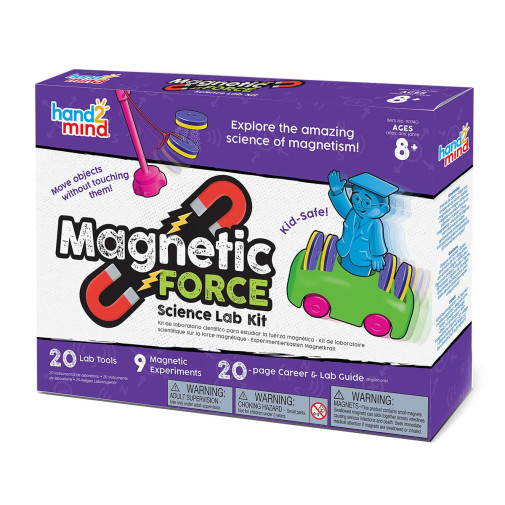We use cookies to make your experience better. To comply with the new e-Privacy directive, we need to ask for your consent to set the cookies. Learn more.
Magnetic Force Science Lab Kit
SKU
078127
Grade K-3
Neutral
Non-Consumable
In Stock
Our Price
$39.99 $39.99 $30.95
Rainbow Savings: $9.04
Item only ships to contiguous U.S. destinations. It will automatically cancel if shipping to non-contiguous U.S.
Warning
Choking Hazard
- Small parts. Not for children under 3 years.
Description
Experiment with magnetic forces with sturdy components like disc magnets, magnetic people figures, magnetic bases, cars with slots for magnets, magnetic wands and iron filing cases. 9 experiments.
Publisher's Description of Magnetic Force Science Lab Kit
Explore the science behind magnets. Children learn the important concepts of magnetic force, levitation, and attraction as they race magnetic cars, build a maglev train and a working compass, and more. This kit also introduces children to different magnet-related STEM careers such as an electrical engineer, medical technician, and particle physicist.
Highlights:
- 9 repeatable, hands-on experiments include making magnets float in midair, using magnetic levitation to move a train, and creating your own compass
What's Included:
- 20 lab tools including disc magnets; iron filings cases; and magnetic wands, people, and roadsters
- 1 Career & Lab Guide
Details
| Product Format: | Other |
|---|---|
| Grades: | K-3 |
| Brand: | Hand2Mind |
| Length in Inches: | 11.5 |
| Width in Inches: | 15 |
| Height in Inches: | 3.125 |
| Weight in Pounds: | 1.75 |
Videos
Reviews
No Ratings
Be the first to review this item
Product Q&A
Have a question? Ask owners.Have a question about this? Ask people who own it.
Start typing and see existing answers.
Instant Answers
- Start typing and we'll see if it was already asked and answered.
- If there aren't already some matches, submit a new question.
- You'll get fast answers from customers who really own the item(s) and from our product experts. (About half the time you'll get an answer in under 2 hours!)
Good Topics To Ask About
- Which items will best meet your needs
- What customers who own an item think of it
- How to use, fix, or take care of an item
- Product information
- General advice related to the types of products we sell
- Our store policies
Customer Support
For questions about an order you have placed, please contact customer support directly.
1 Question
Why did you choose this?
Rainbow Resource CenterStore
More in the category
Related Products
You May Also Like

















My grandson had a great time using these magnets at a STEM night at school.